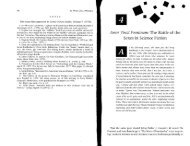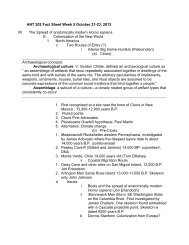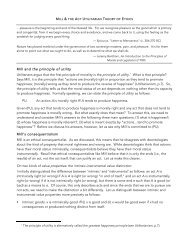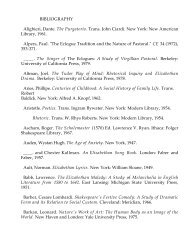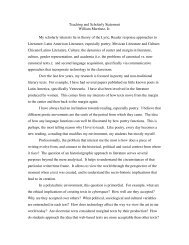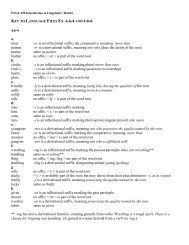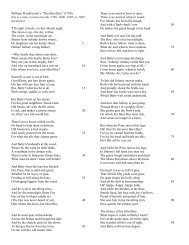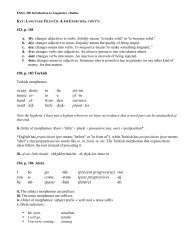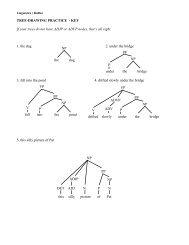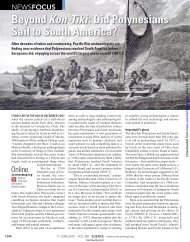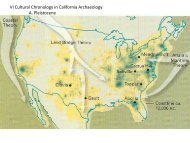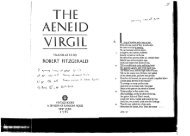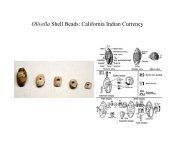On Explaining Existence (Real Possibility as the Key to Actuality)
On Explaining Existence (Real Possibility as the Key to Actuality)
On Explaining Existence (Real Possibility as the Key to Actuality)
Create successful ePaper yourself
Turn your PDF publications into a flip-book with our unique Google optimized e-Paper software.
8 PART ONE: EXISTENCE<br />
Leibniz realized that <strong>the</strong> existence of a world is<br />
pretty much inevitable-that if one is prepared <strong>to</strong><br />
count even <strong>the</strong> “empty world” <strong>as</strong> a world, <strong>the</strong>n <strong>the</strong><br />
existence of a world is categorically necessary.2 But<br />
of course it does not follow (save by a wholly illicit<br />
process of re<strong>as</strong>oning) that a particular world (this<br />
world) necessarily exi~ts.~ Specifically, <strong>the</strong> existence<br />
of a world with things in it, a nonempty world, remains<br />
an open problem.<br />
Moreover, Leibniz realized that this issue of <strong>the</strong><br />
existence of a nonempty world is more fundamental<br />
than and conceptually prior <strong>to</strong> <strong>the</strong> issue of its<br />
nature. The question “Why is <strong>the</strong>re a world with<br />
things in it at all?” is conceptually prior <strong>to</strong> <strong>the</strong> question<br />
“Why is <strong>the</strong> world <strong>as</strong> it is-why do its things<br />
have <strong>the</strong> character <strong>the</strong>y do?”<br />
Leibniz also recognized that it is not creation<br />
that is at issue. Whe<strong>the</strong>r <strong>the</strong> world is eternal (<strong>as</strong><br />
Aris<strong>to</strong>tle had taught) or created (<strong>as</strong> Christian <strong>the</strong>ology<br />
had argued against him) is immaterial. The<br />
question of <strong>the</strong> character of <strong>the</strong> world-why it contains<br />
“things”-will arise ei<strong>the</strong>r way.<br />
For a long time after Leibniz, philosophers<br />
turned <strong>the</strong>ir back on this “riddle of existence.”<br />
They inclined <strong>to</strong> construe it <strong>as</strong> a request for an explanation<br />
for everythmg-all-at-once, and followed<br />
Hume and Kant in thinlung it is not rationally appropriate<br />
<strong>to</strong> <strong>as</strong>k for such global explanations.<br />
But <strong>the</strong> question h<strong>as</strong> refused <strong>to</strong> go away. In <strong>the</strong><br />
manner typical of deep philosophical issues, it resists<br />
burial and keeps springing back <strong>to</strong> life.<br />
It w<strong>as</strong> Henri Bergson who revived <strong>the</strong> issue <strong>as</strong><br />
a <strong>to</strong>pic of 20th-century philosophy. In his cl<strong>as</strong>sic<br />
LJ dvolution crbatrice he wrote:<br />
I want <strong>to</strong> know why <strong>the</strong> universe exists; and if I refer<br />
<strong>the</strong> universe <strong>to</strong> a Principle immanent or transcendent<br />
that supports it or creates it, my thought rests on this<br />
principle only a few moments, for <strong>the</strong> same problem<br />
recurs, this time in its full breadth and generality:<br />
Whence comes it, and how can it be unders<strong>to</strong>od, that<br />
anything exists? . . . Now, if I push <strong>the</strong>se questions<br />
<strong>as</strong>ide and go straight <strong>to</strong> what hides behind <strong>the</strong>m, this is<br />
what I find:-<strong>Existence</strong> appears <strong>to</strong> me like a conquest<br />
over nought . . . If I <strong>as</strong>k myselfwhy bodies or minds<br />
exist ra<strong>the</strong>r than nothing, I find no answer; but that a<br />
logical principle, such <strong>as</strong> A = A, should have <strong>the</strong> power<br />
of creating itself, triumphing over <strong>the</strong> nought through-<br />
out eternity, seems <strong>to</strong> me natural. . . . Suppose, <strong>the</strong>n,<br />
that <strong>the</strong> principle on which all things rest, and which<br />
.all things manifest, possesses an existence of <strong>the</strong> same<br />
nature <strong>as</strong> that of <strong>the</strong> definition of <strong>the</strong> circle, or <strong>as</strong> that<br />
of <strong>the</strong> axiom A += A <strong>the</strong> mystery of existence vanish-<br />
es. . . .4<br />
Clearly, however, this idea of a “conquest over<br />
nothingness” along essentially logical lines is highly<br />
problematic. The “principle on which all things<br />
rest” simply cannot “possess an existence of<strong>the</strong><br />
same natzcre” <strong>as</strong> that of a definition or logical axiom<br />
because (on <strong>the</strong> modern conception of <strong>the</strong> matter,<br />
at any rate) <strong>the</strong>se are purely conceptual truths of<br />
re<strong>as</strong>on (“analytic” truths) from which no factual<br />
juice can be extracted. Getting real existents from<br />
~ur~4~g~c~s~~t~~~~uc~-of-a-<br />
conjuring trick.<br />
That sort of hat cannot contain rabbits.<br />
Martin Heidegger held that <strong>the</strong> question of<br />
“Why is <strong>the</strong>re something ra<strong>the</strong>r than nothing?” is<br />
actually <strong>the</strong> most fundamental question of metaphysics,<br />
characterizing <strong>the</strong> entire subject <strong>as</strong> <strong>the</strong> “exfoliation”<br />
of this ~roblem.~ Heidegger, however,<br />
w<strong>as</strong> much less concerned <strong>to</strong> find a solution <strong>to</strong> <strong>the</strong><br />
problem than <strong>to</strong> explain why <strong>the</strong> desire for an answer<br />
is part of <strong>the</strong> human condition and in examining<br />
its implications for <strong>the</strong> nature of man.<br />
Heidegger’s interest w<strong>as</strong> not in answering <strong>the</strong> question,<br />
but in considering its sigrdicance for us <strong>as</strong> a<br />
creature who, in <strong>the</strong> (inevitable?) absence of understanding,<br />
confronts nothingness in <strong>the</strong> existential<br />
phenomenon of Angst. As one recent commenta<strong>to</strong>r<br />
observes: “So daunting is <strong>the</strong> question [of existence]<br />
that even a recent exponent of it, Heidegger,<br />
who terms it ‘<strong>the</strong> hndamental question of metaphysics,’<br />
proposes no answer and does nothing <strong>to</strong>wards<br />
showing how it might be answered.”6<br />
Ludwig Wittgenstein w<strong>as</strong> also f<strong>as</strong>cinated by this<br />
issue. He maintained that “Not how <strong>the</strong> world is, is<br />
<strong>the</strong> mystical, but that it is.”’ He <strong>to</strong>ld Norman Malcolm<br />
that he sometimes experienced “a certain feeling<br />
of amazement that anythmg should exist at all.”*<br />
In A Lectzlre on Ethics, he returns <strong>to</strong> this <strong>the</strong>me: “it<br />
always happens that <strong>the</strong> idea of one particular experience<br />
presents itself <strong>to</strong> me . . . [and] <strong>the</strong> best way<br />
of describing it is <strong>to</strong> say that when I have it I wonder<br />
at <strong>the</strong> existence of <strong>the</strong> world. And I am <strong>the</strong>n inclined<br />
<strong>to</strong> use such phr<strong>as</strong>es <strong>as</strong> ‘how extraordinary that anything<br />
should exist’ or ‘how extraordinary that <strong>the</strong>




